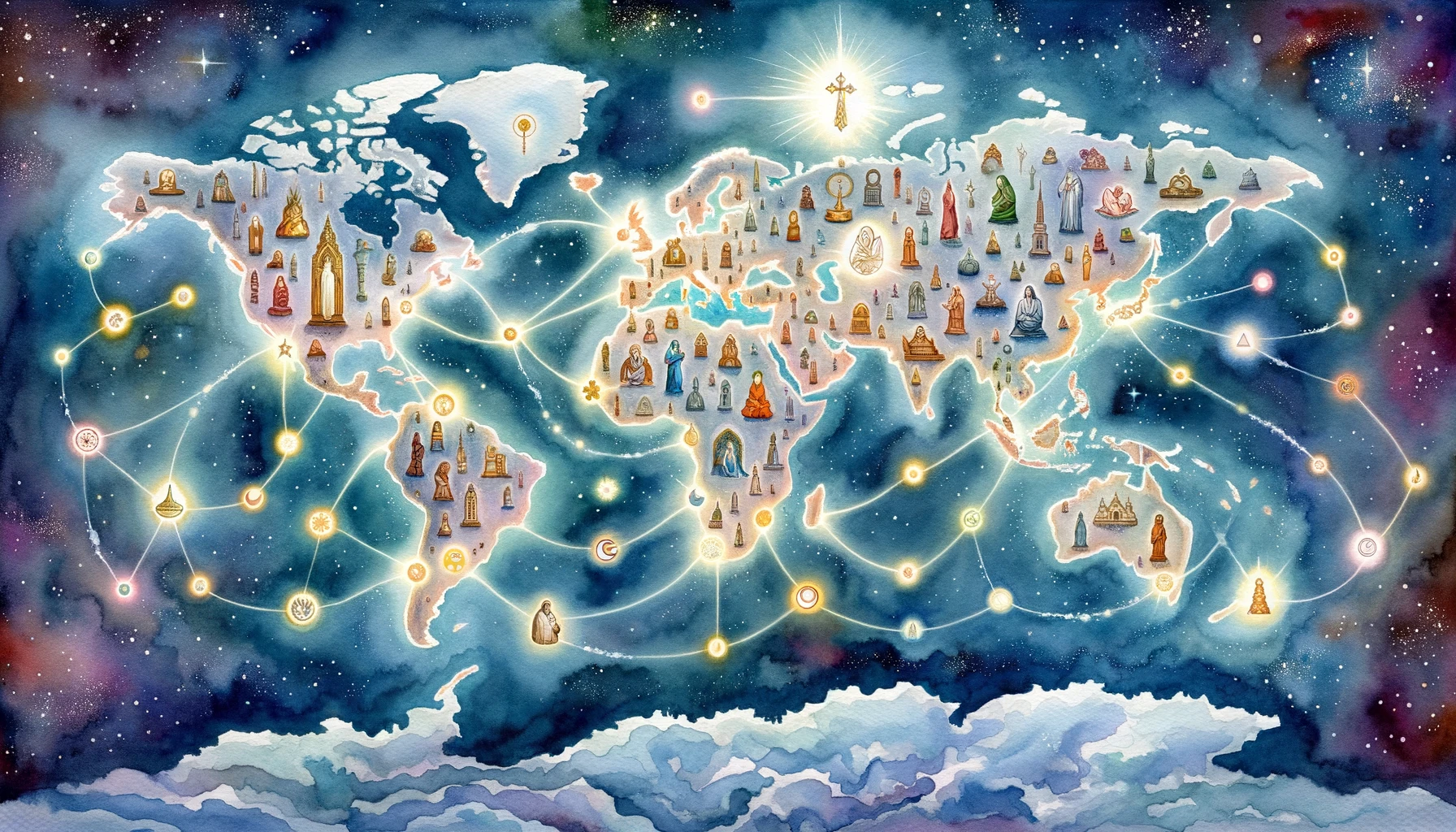In an ever-globalizing world, interaction between different religions and belief systems is inevitable. More than ever, questions about the validity and universality of various faiths resonate among individuals and societies. A crucial query that arises in this discourse is: Do all religions lead to heaven, according to Biblical teachings?
The Christian Perspective on Heaven
The Christian concept of Heaven is an eternal, perfect place prepared by God for those who accept Jesus Christ as their personal savior. It’s an existence full of joy, peace, love, and the direct presence of God (Revelation 21:4).
Within Christianity, there’s a profound belief that God’s plan for humanity is redemption through His Son, Jesus Christ. John 3:16 declares God’s intent – that whoever believes in Jesus will not perish but have everlasting life. This belief is not merely an intellectual assent, but an active faith that leads to repentance and a transformed life (James 2:14-26).
The fundamental Christian belief is that Christ’s death and resurrection are the only means of attaining salvation and, therefore, entry into Heaven. The Bible teaches that Jesus is the Way, the Truth, and the Life, and that no one comes to the Father except through Him (John 14:6). This verse is often interpreted as a clear and exclusive claim that Christianity is the only path leading to eternal life in Heaven.
Contrary to the view of salvation as an earned reward, Christianity emphasizes that it’s a gift of grace from God. One cannot earn a place in Heaven through good deeds or moral excellence. Instead, salvation is a gracious gift from God, granted through faith in Jesus Christ (Ephesians 2:8-9).
Heaven is more than a physical location or state of being. It’s a relational concept, a direct communion with God that begins in this life when one accepts Christ (John 17:3). It’s a state of perfect fellowship with God, free from sin, suffering, and death, to be enjoyed for all eternity.
Christians also believe in the resurrection of the body, based on Christ’s own resurrection. They expect that, in Heaven, they will have new, glorified bodies, free from pain and decay (1 Corinthians 15:42-44).
Heaven in Christian theology is a perfect, joyous place prepared by God for those who have faith in Jesus Christ. It’s an eternal existence in God’s direct presence, free from all forms of suffering. The Christian faith holds that redemption and entry into Heaven come solely through accepting Jesus Christ as one’s savior, emphasizing that salvation is a gift of grace, not an earned reward.
Other Religions and their Path to the Divine
An examination of the world’s major religions reveals diverse perspectives on the ultimate divine reality and the paths leading to it. The plurality of views on salvation and the afterlife is vast and complex, and these differences are worth noting in the context of our central query.
In Islam the pathway to heaven, or Jannah, requires submission to Allah and adherence to the teachings of the Quran. It’s taught that the faithful observance of the Five Pillars of Islam, along with sincere repentance for sins, guides one towards paradise.
Buddhism doesn’t focus on heaven as a final destination but instead emphasizes achieving Nirvana—a state of liberation from the cycle of birth, death, and rebirth (samsara). Achieving this state requires adherence to the Eightfold Path, a guide for moral and spiritual development leading to Enlightenment.
Hinduism, a religion of immense diversity, proposes multiple paths to the divine, through knowledge, devotion, and duty. The ultimate goal is Moksha, a liberation from samsara, much like Nirvana in Buddhism.
Judaism understands the afterlife in varied ways. Some believe in the World to Come (Olam Ha-Ba) where righteous souls experience divine closeness, while others emphasize living a good and righteous life in the present, with less focus on the afterlife.
These brief overviews indicate how different religions approach the divine. As we’ve established, Christianity maintains that faith in Jesus Christ is the only path to Heaven. This perspective may seem exclusive, but it’s rooted in the Christian conviction about the unique role of Christ in human salvation (Acts 4:12). It highlights the special relationship between a believer and Jesus, one that leads to eternal life (John 10:27-28).
World religions offer diverse perspectives on the path to the divine, each with its unique understanding of the afterlife or liberation. Despite these diverse perspectives, Christianity maintains its stance on the exclusive role of faith in Jesus Christ as the pathway to Heaven, underlining the unique and transformative relationship between the believer and Jesus.
Reconciling Interfaith Dialogue and Christian Doctrine
The rise of religious pluralism in society has made interfaith dialogue an essential part of our experience. Christians engage with people of diverse faiths in various spheres of life – at work, in schools, and in community settings. This exposure to different religious perspectives prompts many questions about the exclusivity of the Christian faith and the diverse paths to the divine suggested by other religions.
Christians believe in the Great Commission given by Jesus – to make disciples of all nations (Matthew 28:19). This command suggests a responsibility to share the Christian faith, which necessitates understanding and engaging with the beliefs of others. When Christians participate in interfaith dialogue, they do so with the understanding that, while they respect the beliefs of others, they hold firm to their conviction that Jesus Christ is the only way to Heaven.
In these dialogues, Christians are called to present the gospel message with respect and clarity. They are encouraged to listen attentively, understand deeply, and respond wisely. At the core of these interactions is the goal to share the Christian faith, express love and respect for the dignity of all persons, and stand firm on the uniqueness of Jesus Christ and His message of salvation.
In all these interactions, Christians strive to be true to the teachings of the Bible. While appreciating the ethical and moral teachings common to many religions, Christians uphold the unique role of Jesus Christ in providing salvation. The affirmation of Christ as the only way to Heaven is not intended to demean or invalidate the sincere beliefs of others but is an expression of the Christian faith based on Biblical teachings (John 14:6).
Respecting the diversity of religious beliefs does not necessitate accepting that all paths lead to Heaven. Christians are encouraged to navigate the terrain of religious pluralism with a balance of respect for others and a firm commitment to their faith.
Standing Firm on the Rock of Our Faith
Navigating the religious landscape of our world today can often seem complex and challenging. However, as Christians, we find our guide in Jesus Christ, our cornerstone. His teachings provide us with clarity, even in the midst of diverse beliefs, religions, and interpretations. While we respect and engage with the faith traditions of our neighbors, we hold steadfast to our belief that Jesus Christ is the singular path to Heaven, and through Him, we receive the gift of eternal life.
As we have journeyed through this topic together, consider these personal reflections:
- How does my faith in Jesus Christ shape my engagement with other religions?
- What steps can I take to articulate my faith clearly and respectfully in interfaith dialogues?
- How can I demonstrate Christ’s love to others while upholding the exclusive claims of my Christian faith?
In this world of many paths, let us find strength in the steadfastness of our faith, the rock upon which we stand. Even as the waves of different beliefs crash around us, we remain anchored in Christ. His way, His truth, His life – these guide us and give us hope.














